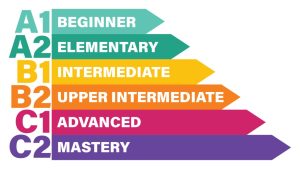International exams, regardless of their origin, generally serve the same purpose: training candidates in competencies (speaking, reading, listening comprehension, and writing) and providing them with the necessary tools and strategies to navigate a second language.
What is an international exam?
There are different types of exams. The first major distinction is between those that do not have a predetermined level or a passing grade but rather assign a score that reflects the candidate’s level (IELTS, TOEFL, TOEIC, among others). It is worth noting that these exams are not recommended for candidates with a basic level of English. For them, it is advisable to have taken English classes with teachers or have a solid foundation.
On the other hand, there are exams that are divided by levels and require a minimum score to pass, such as Cambridge Key, Preliminary, First, and Advanced.
Some exams can be taken in modules, while others assess all four skills. Most of them can now be taken on a computer, and the most innovative ones use AI (LinguaSkill).
There are also exams that evaluate general English with a more academic orientation, those focused on English for everyday life and work, and more specialized ones that measure knowledge in fields such as medicine, finance, or law.
We can say that there is something for everyone. In general, costs vary little, are in US dollars, and it is always important to check the certification’s expiration period. Some do not expire, but others are valid for a maximum of two years.
Beyond that, we always recommend preparing for these exams with professionals who not only teach you the language in general but also how to take the exams and how to approach them.
What are they for?
International English exams have many benefits, including:
- Official certification: They certify the English level according to global standards such as the CEFR*.
- International recognition: They are accepted by universities, employers, and official organizations in different countries.
- Academic opportunities: They allow access to study programs in English-speaking institutions.
- Advantage in the job market: They enhance professional profiles and improve employment opportunities.
- Facilitation of immigration procedures: Some countries require them for study, work, or residence visas.
- Improved learning: Preparing for these exams helps develop language skills in a structured and effective way.
What is the CEFR (Common European Framework of Reference for Languages) and why is it important?
The CEFR (Common European Framework of Reference for Languages) is an international standard that describes language skills at six levels (A1, A2, B1, B2, C1, and C2), from beginner to advanced. It serves as a reference for assessing and certifying a speaker’s level in a foreign language.
In the context of international exams, the CEFR provides a common framework to ensure that certifications are compared and recognized worldwide.
These are the different levels:

Useful tips for choosing which English exam to take
When deciding to take an international exam, it is essential to consult a qualified professional who follows these steps:
- First, determine the candidate’s starting level.
- Identify the candidate’s specific needs to select the most appropriate exam.
- Create a realistic and achievable plan that makes it clear that the work must be constant and conscious, and that the process is more about training than acquiring knowledge. With this, we emphasize the importance of CONTINUITY in achieving the goal.
Preparing for an international exam is ALWAYS USEFUL, regardless of whether the exam is taken or not. As mentioned earlier, it provides tools, techniques, and strategies for handling situations in various contexts. These skills can then be transferred to other areas of daily and professional life.
If you are interested in preparing yourself or your company’s team for any of these exams, do not hesitate to contact us!


